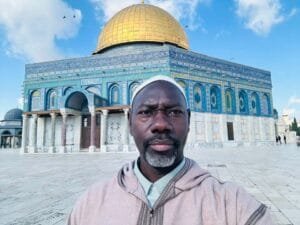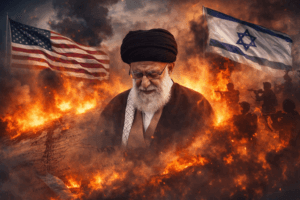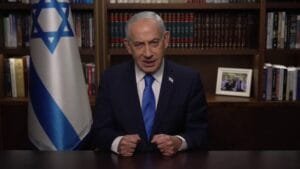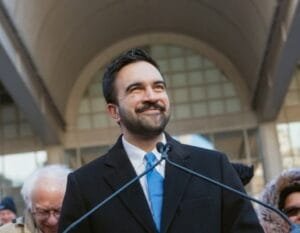Rivals attack Farage for saying West provoked Ukraine war

Nigel Farage has been criticized for suggesting the West “provoked” Russia’s invasion of Ukraine by expanding the European Union and Nato military alliance eastward.
The Reform UK leader told the BBC that “of course” the war was President Vladimir Putin’s fault.
But he added that the expansion of the EU and Nato gave him a “reason” to tell the Russian people “they’re coming for us again”.
Conservative Home Secretary James Cleverly said Farage was echoing Putin’s “vile justification” for the war and Labour branded him “unfit” for any political office.
The former UKIP leader later said he was one of “the few figures” who had been “consistent and honest” on the issue.
In an interview with the BBC’s Nick Robinson, Farage was challenged over his judgment and past statements, including when he named Russian President Vladimir Putin as the world leader he most admired in 2014.
“I said I disliked him as a person, but admired him as a political operator because he’s managed to take control of running Russia,” Farage said.
He was then pressed over a social media post in February 2022, when he claimed the Russian invasion of Ukraine was “a consequence of EU and Nato expansion”.
Farage said he had been arguing since the 1990s that “the ever eastward expansion” of the Nato military alliance and the EU was giving President Putin “a reason to [give to] his Russian people to say they’re coming for us again and to go to war”.
He added: “We provoked this war. Of course, it’s [President Putin’s] fault.”
Responding to the interview, Conservative Home Secretary James Cleverly said Farage was “echoing Putin’s vile justification for the brutal invasion of Ukraine”.
Labor defense spokesman John Healey said Farage’s comments made him “unfit for any political office in our country, let alone leading a serious party in Parliament.”
Former Nato Secretary General Lord Robertson accused Farage of “parroting the Kremlin Line” and “producing new excuses for the brutal, unprovoked attack”.
During the interview, the Reform UK leader claimed Lord Robertson had agreed the war was caused by the expansion of the EU.
Speaking on BBC Radio 4’s The World Tonight, the Labour peer denied saying it and described Farage’s statement as “complete nonsense”.
“Saying that we provoked Russia is like saying that if you buy a burglar alarm, in some way you provoke burglars.”
Guy Verhofstadt, a prominent Belgian MEP and frequent critic of Farage, also accused him of repeating “Kremlin talking points”.
“In the European Parliament, Farage always defended Putin”, he said.
“Every vote for Farage is celebrated in Moscow!”
After the interview aired on Friday, Farage said on X (formerly Twitter) that he was “one of the few figures that have been consistent and honest about the war with Russia”.
Alongside the new statement, he reposted a speech in the European Parliament from 2014 in which he called for the West to “stop playing war games with Putin.”
Russia launched a full-scale invasion of Ukraine in February 2022. It followed the occupation of the Crimea and Donbas regions in 2014.
Ukraine is not a member of the EU or Nato, which is made up of 32 countries across Europe and North America.
However, the country applied to join both blocs following the Russian invasion.
Nato was formed in 1949 by 12 countries, including the US, UK, Canada and France.
After the Soviet Union’s collapse in 1991, many Eastern European countries joined including Hungary, Poland and Estonia.
The EU has also expanded since the 1990s, with a number of eastern European countries joining in 2004.
In the interview, Farage also accused the Conservatives of failing to deliver on Brexit.
As the leader of UKIP, he was a key figure in the campaign to leave the EU.
While the issue dominated the 2019 general election, with Boris Johnson campaigning on the slogan “Get Brexit Done”, it has not featured prominently in the current campaign.
Asked if he stood by his previous claim that Brexit had failed, Farage said: “No, it’s not a failure but we failed to deliver.
“It can’t be a failure. We’ve left the European Union. We’re now self-governing.”
But he added: “Brexit has failed those who voted for it, believing that immigration numbers would be reduced.”
Net migration — the difference between the number of people coming to live in the UK and those leaving — has risen sharply since 2021, when the UK left the EU.
This has been driven by non-EU nationals coming to the UK.
Net migration reached record levels in 2022 before reducing slightly the following year.
Reform UK has said it backs a freeze on non-essential immigration to relieve pressure on housing and public services, increase wages and “protect our culture identity and values”.
Farage also criticized the Conservatives for “binning” their promise to scrap 4,000 EU laws.
Pressed over whether he was just blaming others, Farage said: “If you put me in charge, it would be very, very different. Of course, they didn’t do that.
“The Conservative Party never believed in Brexit… They picked it up as a political opportunity, and they failed to deliver.”
Farage also faced questions over his stance on climate change and whether he believed it is not really a “crisis”.
“I do think ever since the late 1980s that perhaps there’s been a bit of hype around this, and I think that perhaps is wrong,” he said.
“All we ever talk about is fear rather than solutions.”
He added: “We spend too much time hyperventilating about the problem rather than thinking practically and logically what we can do.”
Farage branded the Labour and Tory net zero policies “nonsense”, claiming £30bn a year could be saved by dropping their climate pledges.
He was also challenged over Reform’s vetting procedures after the party dropped a number of potential parliamentary candidates over inappropriate or offensive comments.
The party has blamed a company it hired to conduct background checks on would-be candidates, claiming it failed to carry out vetting before the election was called.
Asked why some people with extreme views appeared to rally to his cause, Farage said: “They’re not there because of me.”
Despite co-founding the party and being its honorary president, he insisted: “I have had no involvement with the day-to-day running of the party for over three years.
“These candidates were recruited before I said I was going to play an active role in the party.”
Farage took over as Reform leader from Richard Tice only in the second full week of the election campaign.
At the same time he announced he would run as a candidate himself in Clacton after previously saying he would not stand in July’s election.















